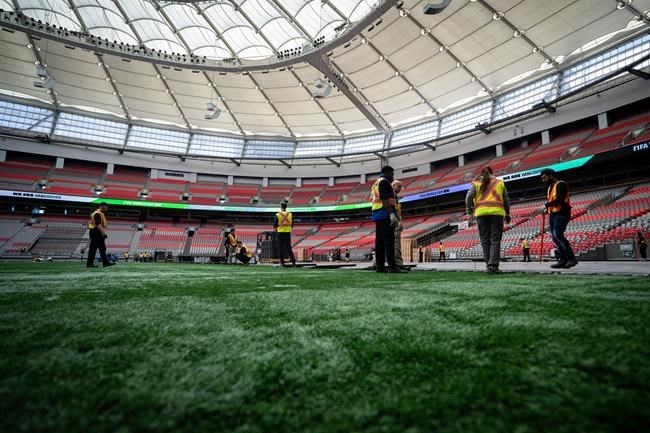VANCOUVER — Organizers of the seven FIFA World Cup soccer matches coming to Vancouver in 2026 say the estimated cost of hosting the event has more than doubled in the last two years.
The latest estimates put the price tag at between $483 million and $581 million, including costs for the city, the province and stadium upgrades.
However, the B.C. government says the event is expected to generate enough revenue to result in a net cost of between $100 million and $145 million.
Minister of Tourism Lana Popham said Tuesday the event will bring about 350,000 fans to the province and generate more than a billion dollars for tourism in the five years following the games.
Documents say the fresh numbers include updated hosting, operating and capital requirements following FIFA site visits, increased inflation assumptions, and provincial costs, such as public sector essential services.
The original cost estimate of $260 million released in March 2022 was for five matches, and was before Vancouver was chosen as a host.
An updated figure, released by the B.C. government at the end of January 2023, put the cost of hosting five matches in Vancouver at $230 million without including stadium improvements, and since then FIFA has added two more games.
Popham said the initial estimate was before officials had a full understanding of the requirements to host, which include the need for training sites and fan festivals.
"It was interesting because obviously we originally said no, but there's been more opportunities that have been brought to us. FIFA has added in more revenue generating opportunities for the province," she said.
"And so, when you look at all of that, we believe that this investment is a good deal for British Columbians. We are looking at the return on this dollar as something that is extremely positive."
Vancouver Mayor Ken Sim said hosting the games is a "no brainer."
"Sure, there's going to be more costs and revenue, but if you stretch it over the long term, the benefits are massive, and they will more than pay for that deficit," he said, adding that the city will be hosting the equivalent of "30 to 40 Super Bowls" worth of people over the course of the month.
As much as $196 million has been earmarked for upgrades to BC Place where the matches will be played, as well as operational costs during the tournament. The stadium, which can hold up to 54,500 people, was built in 1983, but had extensive upgrades for the 2010 Winter Olympics.
Vancouver has been promised that two of its games will involve Team Canada.
Ahead of the news conference, the general manager of BC Place, Chris May, took reporters on a tour of the arena to showcase what upgrades and renovations would be prioritized.
They included adding more and larger elevators, gender neutral bathrooms, as well as improved Wi-Fi and a new central video board.
As part of the tour, May showed reporters a soundboard that he said had been used since the stadium opened.
"I think that may need to move up to the BC Hall of Fame once the renovations are made," May joked about the board.
A natural grass pitch will be installed, but officials say it is too soon to know if it will remain after the World Cup is over, given the challenges that come with maintaining the surface during frequently changing events at the stadium.
Popham said it's estimated hotels will be at 75 per cent capacity during the games.
Sim said the demand for rooms will encourage those who want to invest in hotels.
"We're going to make it easier to build hotel rooms and investors will come in and they will build more hotel rooms, which will add capacity to the tourism industry here," he said.
"It will help restaurants, it will create jobs, it will be a bigger tax base and those taxes can go and fund social programs. So, this is a winner. This is a great problem to have," he said.
Federal Minister of Sport Carla Qualtrough said Ottawa's investment of $115.66 million will support operation and capital costs, including the stadium upgrades.
"Soccer is the world's game and the world is coming to Canada in 2026," she said.
Toronto and Vancouver are the two Canadian cities that will host matches during the 2026 World Cup, which will also be played in the United States and Mexico.
The City of Toronto released a new estimate in February for its games of $380 million, an increase of $80 million compared with a 2022 forecast, partly because of the addition of another match to the schedule.
FIFA announced last year that it had approved a bigger group stage in 2023. By retaining groups of four teams instead of three, 24 games were added to the 80 already set out for the tournament.
Todd Stone, the Opposition BC United house leader, said B.C. residents would get a more complete picture of the cost of hosting the event if the government released the agreements the province signed with FIFA.
"Six hundred million dollars, that's double what the original budget was as of a year ago," said Stone at the B.C. legislature. "We're going to continue to press the government for what accounts for the cost escalation. Is that as high as the numbers will be?"
This report by The Canadian Press was first published April 30, 2024.
Brieanna Charlebois and Ashley Joannou, The Canadian Press



